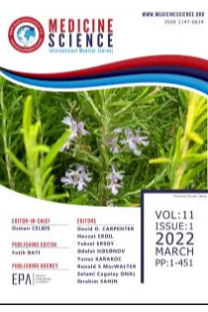Ethical Controversies in Forensic Psychiatry Recovered
___
1. Sharma S, Sharma G. Exploring evolving concepts and challenges in forensic psychiatry. World Psychiatry. 2006;5(2):97-8.2. Wettstein R. M. Ethics and forensic psychiatry. Psychiatr Clin North Am. 2002;25(3):623-33.
3. Bluglass R. Advances in forensic psychiatry in England and Wales. Int J Law Psychiatry. 1981;4(1-2):199-212.
4. O'Brien KP. Pivotal issues in forensic psychiatry. Aust N Zeal J Psychiatry. 1998;32(1):1-5.
5. Blueglass R, Bowden P, eds, Principles and practice of forensic psychiatry. London: Churchill Livingstone. 1990;103-9.
6. Beauchamp T, Childress J: Principles of Biomedical Ethics, 3rd edition. Oxford University Press, NewYork,1989.
7. Sen P, Gordon H, Adshead G, Irons A. Ethical dilemmas in forensic psychiatry: two illustrative cases. J Med Ethics. 2007;33(6):337.
8. Chalmers I, Glasziou P, Godlee F. All trials must be registered and the results published. BMJ 2013;346:f105.
9. American Psychiatric Association. Ethics Primer of the American Psychiatric Association. American Psychiatric Pub. 2008;66-7.
10. Appelbaum PS. The parable of the forensic psychiatrist: ethics and the problem of doing harm. Int J Law Psychiatry. 1990;13(4):249-59.
11. Appelbaum PS. A theory of ethics for forensic psychiatry. J Am Acad Psychiatry Law. 1997;25(3):233-47.
12. Knapp S, Handelsman MM, Gottlieb MC, VandeCreek LD. The Dark Side of Professional Ethics. Prof Psychol Res Pr. 2013;44(6):371-7.
13. Tjeltveit AC, Gottlieb MC. Avoiding the road to ethical disaster: Overcoming vulnerabilities and developing resilience. Psychotherapy: Theory, Research, Practice, Training. 2010;47(1):98-110.
14. Rogerson, MD, Gottlieb MC, Handelsman MM, Knapp S, Younggren J. Nonrational processes in ethical decision making. American Psychologist. 2011;66(7):614-23.
15. Gutheil TG. Slater FE. Commons ML, et al. Expert witness travel dilemmas: a pilot study of billing practices. Bull Am Acad Psychiatry Law. 1998;26(1):21-26.
16. Gutheil TG. "The whole truth" versus "the admissible truth": an ethics dilemma for expert witnesses. J Am Acad Psychiatry Law. 1998;31(4):422-7.
17. Boettcher B. Criminalization in forensic psychiatry. http://www.priory.com/psych/ criminal/htm access date 01.10.2014
18. Alan C, Tjeltveit AC, Gottlieb M. Avoiding Ethical Missteps. The Monitor on Psychology. 2012;43(4):68.
19. Stone AA. The ethical boundaries of forensic psychiatry: a view from the ivory tower. Bull Am Acad Psychiatry Law. 1984;12(3):209-19.
20. Flórez JA. Forensic psychiatry: contemporary scope, challenges and controversies, World Psychiatry. 2006;5(2):87-91.
21. Moran M. AMA to Evaluate M.D. role in detainee interrogation. Psychiatric News. 2005;40.
22. Lifton JR. Doctors and torture. N Engl J Med. 2004;351(4):415-6.
23. Sharfstein S. Medical ethics and the detainees at Guantanamo Bay. Psychiatric News. 2005;40.
24. Alec Buchanan. Respect of dignity as an ethical principle in forensic psychiatry. Legal and Criminological Psychology. 2014;19(1):30-2.
25. Lifton RJ. Doctors and torture. N Engl J Med 2004;351(5):415-6.
26. Arboleda-Flórez. Forensic psychiatry: two masters, one ethics. Die Psychiatrie. 2005;2:153-7.
27. American Academy of Psychiatry and the Law: American Academy of Psychiatry and the Law Ethics Guidelines for the Practice of Forensic Pschiatry. Bloomfield, CT, AAPL, 1995.
28. Comittee on Ethical Guidelines for Forensic Psychologists: Spcialty guidelines for forensic psychologists. Law Hum Behav. 1991;15:655-65.
29. American Psychological Association: Ethical principles of psychologists and code of conduct. Am Psychol. 1992;47:1597-611.
30. Gutheil TG. Psychiatric expert witnesses in the new millennium. Psychiatr Clin North Am. 2006;29(3):823-32.
31. Austin, Wendy, Erika Goble, and Julija Kelecevic. "The ethics of forensic psychiatry: moving beyond principles to a relational ethics approach. J Am Acad Psychiatry Law. 2009;20(6):835-50.
- ISSN: 2147-0634
- Yayın Aralığı: 4
- Başlangıç: 2012
- Yayıncı: Effect Publishing Agency ( EPA )
Gökay GÖRMELİ, Cemile Ayşe GÖRMELİ, MUSTAFA KARAKAPLAN, REŞİT SEVİMLİ, Mehmet Cengiz ÇOLAK, Cemal FIRAT, KAYA SARAÇ, YÜKSEL ERSOY
A Simple New Classification for Diabetic Foot Ulcers
Talib Saddam MOHSİN, Batool Mutar MAHDİ, Hyam RAOUF, Haider Hashim ZALZALA, Laheeb Ali ABİD, Zena NEHAD
Adrenokortikal Karsinomlarda Tedavi Ve İzlem
Is Irisin an Anticarcinogenic Peptide?
SUAT TEKİN, YAVUZ ERDEN, SÜLEYMAN SANDAL, Bayram YILMAZ
Beyindeki Mitokondriyal Eşleşme Bozucu Proteinler: Yapısı, İşlevi Ve Fizyolojik Rolleri
YAVUZ ERDEN, SUAT TEKİN, Sevda KIRBAĞ, SÜLEYMAN SANDAL
The Relationship of Systemic Lupus Erythematosus and Helicobacter Pylori
Tülay YILDIRIM, Oğuzhan YILDIRIM
Songül Barlaz US, Esil KARA, Aslı YAZICI, Bahar DİRİCAN, Eda Kaya PEPELE, ŞİMAY GÜROCAK
Hemodiyaliz Hastalarında Algılanan Sosyal Desteğin Sosyal Görünüş Kaygısına Etkisi
DERYA ATİK, Cem ATİK, Ridvan ASAF, Sezgi ÇINAR
Successful Management of an Esophageal Foreign Body with a Rigid Bronchoscopy
